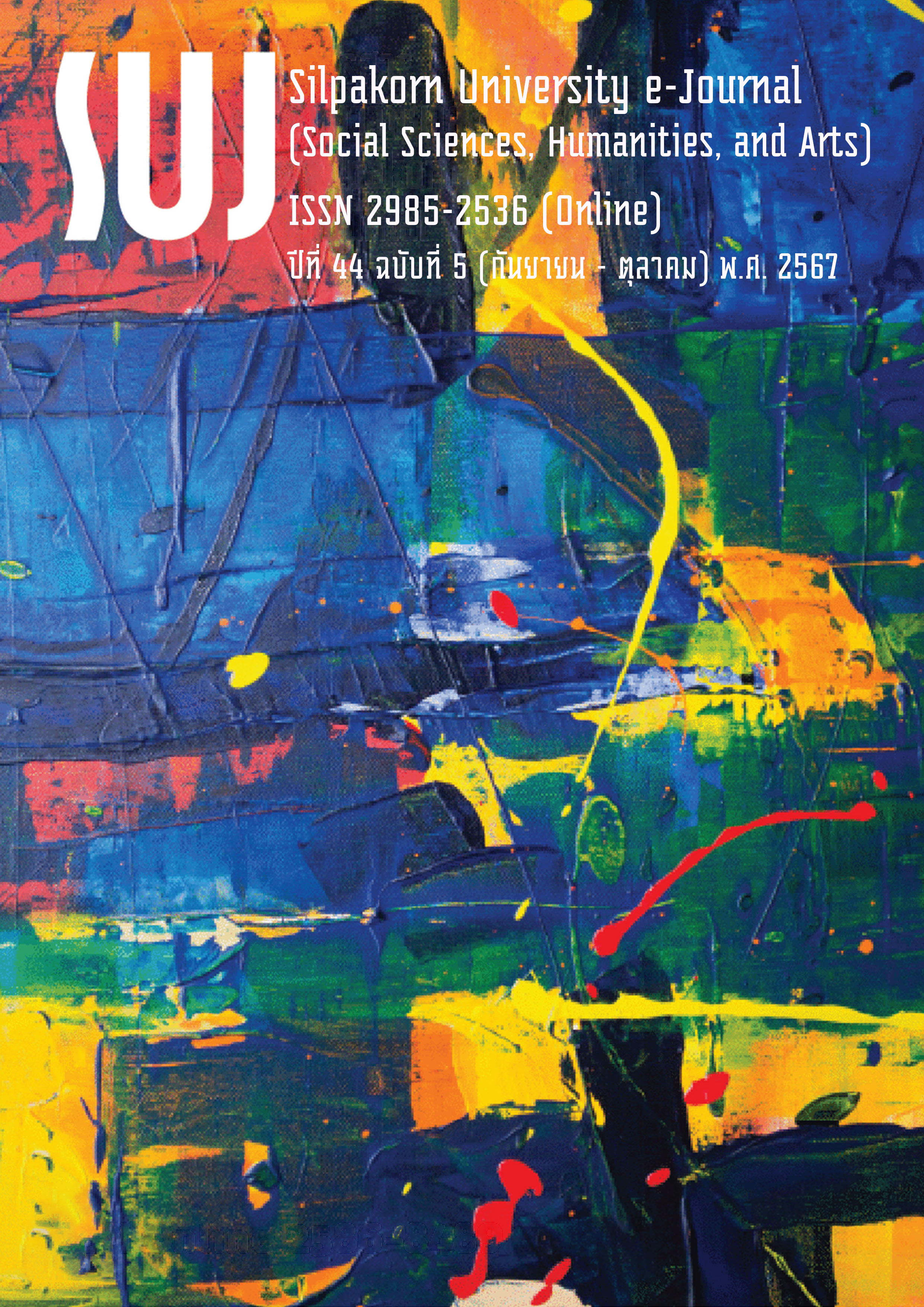“ตัวตน” ใน “1984” ของจอร์จ ออร์เวลล์ (“Self” in George Orwell’s 1984)
Main Article Content
Abstract
บทความเรื่องนี้ ผู้เขียนพยายามเชื่อมโยงหลักการลดละตัวตนทางปรัชญาและศาสนากับแนวคิดการสละประโยชน์ส่วนตัวเพื่อประโยชน์ของส่วนรวมตามทฤษฎีสังคมนิยม ด้วยการพิจารณา “ตัวตน” ของตัวละครจากนวนิยายที่ต่อต้านระบอบสังคมนิยม เรื่อง “1984” ในแง่ที่หมายถึงปัจเจกบุคคลอันประกอบด้วยร่างกาย จิตใจ และมีสติสัมปชัญญะอย่างสมบูรณ์พร้อมรัฐเผด็จการใน “1984” ได้วางกลไก “การสร้างตัวตน” และ “การทำลายตัวตน” ไปพร้อม ๆ กัน กระบวนการสร้างตัวตนมีขึ้นกับตัวละครพี่เบิ้มในฐานะผู้นำสูงสุดและโกลด์สไตน์ที่เป็นศัตรูหมายเลขหนึ่ง โดยใช้หลักการเดียวกัน คือ “การข่ม”และ “การขู่” เพื่อให้รู้สึกกลัว ส่วนการทำลายตัวตนใช้สองแบบ แบบแรกเป็นการทำให้บุคคลระเหยหายไปจากสังคม เกิดขึ้นกับพ่อแม่ของวินสตันและปู่ของจูเลีย ที่เป็นตัวละครเอก สหายวิธเธอรส์ ไซมฺ และแอมเพิลฟอร์ธ ซึ่งเป็นสมาชิกพรรค ส่วนแบบที่สองใช้การทำให้บุคคลปราศจากความหมายต่อสังคมขณะที่ยังมีชีวิตอยู่ โดยเกิดขึ้นกับวินสตัน สมาชิกพรรคที่มีความคิดนอกรีต ลักษณะเด่นของกลไกการทำลายตัวตน คือ “การกด” และ “การข่มเหง” เพื่อให้ปัจเจกบุคคลรู้สึกต่ำต้อยด้อยค่า บทความเรื่องนี้ทำให้เห็นถึงความสัมพันธ์อย่างใกล้ชิดระหว่างวรรณกรรมกับบริบททางการเมืองและสังคม และสามารถใช้เป็นแนวทางในการศึกษาวรรณกรรมของต่างประเทศต่อไปได้
This article attempts to relate the concepts of self-effacement in philosophy and religion with the socialist theory of sacrificing personal interests for the collective good. The focus is on examining the “self” as it pertains to the individual in the anti-socialist novel 1984. This includes the body, mind, and total consciousness of the individual. The totalitarian state in 1984 has implemented mechanisms for both “self-creation” and “self-destruction” simultaneously. The self-creation process is seen in the figures of Big Brother, the supreme leader, and Goldstein, the number one enemy, using the same strategy – to “suppress” and “threaten” individuals into state of fear. There are two ways in which “self” can be destroyed. The first type causes the individual to disappear from society, as happens to Winston’s parents, Julia’s grandfather, and Party members like Comrades Withers, Syme, and Ampleforth. The second type renders individuals meaningless to society while they are still alive, as happened to Winston, an unorthodox Party member. The process of self-destruction typically involves “pressing” and “persecuting” individuals to make them feel worthless and inferior. This article reveals a close relationship between literature and its social and political contexts and can serve as a framework for further studies in foreign literature.
Downloads
Article Details

This work is licensed under a Creative Commons Attribution-NonCommercial-NoDerivatives 4.0 International License.
References
Buddhadasa Bhikkhu. (2022). Human Manual (คู่มือมนุษย์). Bangkok: Pimdee.
Campbell, J. (Writer), Moyers, B. (Writer), & Attagara, K. (Ed.). (2008). The Power of Myth (พลานุภาพแห่งเทพปกรณัม) (B. Boonsong, Trans.). Bangkok: Amarin Printing and Publishing.
Larkin, E. (2017). Finding George Orwell in Burma (จิบพม่า ตามหาจอร์จ ออร์เวลล์ ประวัติศาสตร์ระหว่างบรรทัดในร้านน้ำชา), 2nd ed. (S. Bhumiprabhas, Trans.). Bangkok: Matichon.
Mallikamas, Kulap. (2019). Literary Criticism (วรรณคดีวิจารณ์) (20th ed.). Bangkok: Ramkhamhaeng University Press.
Matichon Weekly. (2016). Definition of “Self”, Summarization of “I” and “Mine”, Attavadupadana (นิยามแห่งอัตตา รวบยอดตัวกูและของกู อัตตวาทุปาทาน). [Online]. Retrieved October 12, 2024 from https://www.matichonweekly.com/column/article_18470
Nimmanahaeminda, Prakong. (2000). Folktale Studies (นิทานพื้นบ้านศึกษา). Bangkok: Chulalongkorn University.
Orwell, G. (2020). 1984 (หนึ่ง-เก้า-แปด-สี่), 6th ed. (R. Paoluengtong & A. Patipatpaopong, Trans.). Bangkok: SM-Thaipublishing House.
Orwell, G. (Writer), & Chakriyanon, P. (Ed.). (1993). Homage to Catalonia (แด่คาทาโลเนีย), 2nd ed. (Sodsai (Sodsai Khantiworapong), Trans.). Bangkok: Kledthai.
Petrie, W. M. F. (2007). Egyptian Tales (นิทานโบราณคดีอียิปต์) (K. Attagara, Trans.). Bangkok: Amarin Printing and Publishing.
Phra Dhammakittiwong (Thongdee Suratecho). (2005). The Dictionary for Buddhist Studies, Clergy Terms (พจนานุกรมเพื่อการศึกษาพุทธศาสน์ชุดคำวัด). Bangkok: Liang Chiang for Buddhism Publishing.
Plato. (2012). Plato : Symposium (เพลโต : ซิมโพเซียม) (K. Attagara, Trans.). Bangkok: Amarin Printing and Publishing.
Prabhavananda, S., & Manchester, F. (2010). The Upanishads : Breath of the Eternal, the Wisdom of the Hindu Mystics (อุปนิษัท : คัมภีร์เพื่อความสงบศานติ ปัญญาญาณของพระมุนีฮินดู) (K. Attagara, Trans). Bangkok: Amarin Printing and Publishing.
Suvannanonda, Bancha. (2015). Know Orwell : จอร์จ ออร์เวลล์ (Know Orwell: George Orwell). Bangkok: Bookmoby Press.
Suwanmongkol, Pathan. (n.d.). Socialism (สังคมนิยม). [Online]. Retrieved October 10, 2023 from http://wiki.kpi.ac.th/index.php?title=สังคมนิยม
The Royal Institute. (2013). The Royal Institute’s Dictionary B.E. 2554 (พจนานุกรม ฉบับราชบัณฑิตยสถาน พ.ศ. 2554) (2nd ed.). Bangkok: Nanmeebooks.
Winichakul, Thongchai. (2020). Power and Rebellion (อำนาจกับการขบถ). In 1984 (หนึ่ง-เก้า-แปด-สี่), 7th ed. (pp. 401-430). Bangkok: SM-Thaipublishing House.


